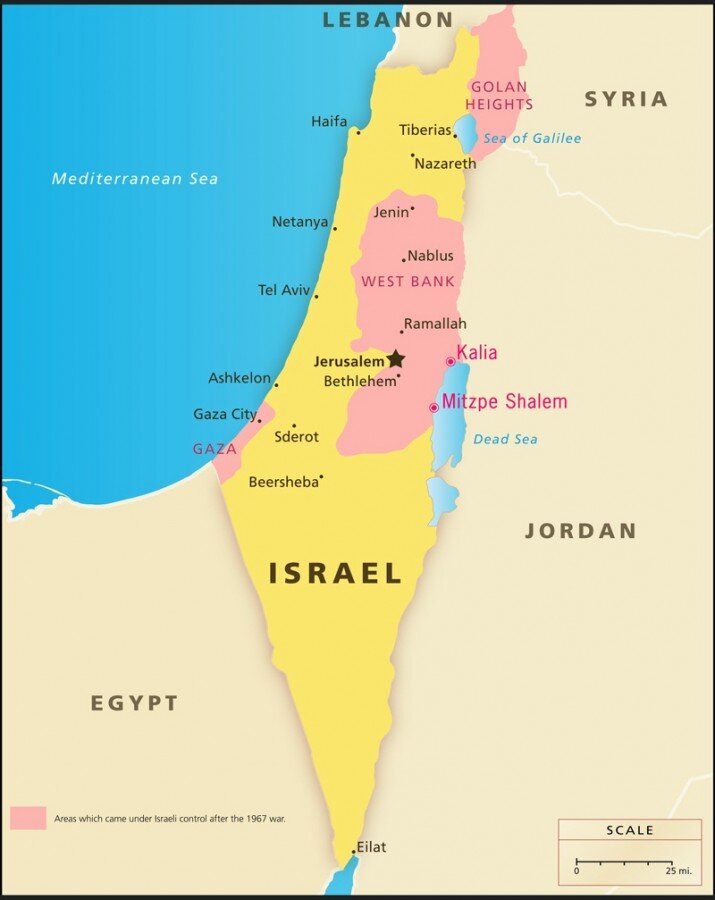International Relations
US-Israel Talks on West Bank Annexation
- 14 May 2020
- 5 min read
Why in News
Recently, US Secretary of State Mike Pompeo met Israeli Prime Minister Benjamin Netanyahu to discuss Israel's plans to annex parts of the West Bank.
- Pompeo’s visit was exempted from Israel’s mandatory two-week quarantine for arrivals and shut borders due to the Covid-19 pandemic.
- For Israel, this visit was an indication of the strength of its alliance with the USA and the talks focused on discussions on annexation, shared concerns about Iran, the battle against the coronavirus, Israel’s incoming government and threats from Israel’s ties with China.
- Israel-China Ties: The US has reportedly been pressuring Israel to rethink a bid by a Hong Kong company to build a massive desalination facility.
Key Points
- Plans for Annexation of West Bank
- Israeli hard-liners are eager to unilaterally redraw the Mideast map before November’s US Presidential Election.
- The presumptive Democratic nominee, Joe Biden, is in the opposition of unilateral annexation plans by Israel.
- Annexation would give Donald Trump an accomplishment to shore up his pro-Israel base, particularly politically influential pro-Israel evangelical (of or according to the teaching of the gospel or the Christianity) Christian voters.
- These voters believe in the notion that God promised the land to Jews and it should be returned to them.
- Background
- The Israel-Palestine Conflict can be traced back to 1917.
- Mideast War, 1967: It is also known as the six-day war or Third Arab-Israeli war. Israel captured the West Bank, east Jerusalem and Gaza Strip in the war. The Palestinians seek these territories for a future independent state. In the decades since, Israel has built settlements in the West Bank and east Jerusalem that now house nearly 700,000 Israelis. Most of the international communities consider these settlements a violation of international law and obstacles to peace.
- Mideast Plan or Middle East Peace Plan: It was unveiled by Trump in January, 2020. Under it, the Palestinians would have a limited statehood contingent on a list of stringent requirements while Israel would annex some 30% of the West Bank.
- The Palestinians rejected the plan and threatened to withdraw from key provisions of the Oslo Peace Accords, which are a series of agreements between Israel and the Palestinians signed in the 1990s.
- The Trump administration believes that Israel’s West Bank settlements are consistent with international law and supports the annexation of West Bank territory, as long as Israel agrees to enter peace talks with the Palestinians.
- Criticism
- The annexation will trigger widespread international condemnation because it will crush already faint Palestinian hopes of establishing a viable state on the lands captured by Israel in the Mideast war.
- The Arab League has mentioned the annexation as a war crime.
- The European Union (EU) and other individual member states, have warned of tough consequences if Israel moves forward in the annexation process.
- India’s Stand
- India was one of the few countries to oppose the United Nations’ partition plan in November 1947, echoing its own experience during independence a few months earlier.
- India recognised Israel in 1950 but it is also the first non-Arab country to recognise Palestine Liberation Organisation (PLO) as the sole representative of the Palestinians. India is also one of the first countries to recognise the statehood of Palestine in 1988.
- In 2014, India favored the United Nations Human Rights Council’s (UNHRC) resolution to probe Israel’s human rights violations in Gaza. Despite supporting the probe, India abstained from voting against Israel in UNHRC in 2015.
- As a part of Link West Policy, India has de-hyphenated its relationship with Israel and Palestine in 2018 to treat both the countries mutually independent and exclusive.
- In June 2019, India voted in favor of a decision introduced by Israel in the UN Economic and Social Council (ECOSOC) that objected to granting consultative status to a Palestinian non-governmental organization.







